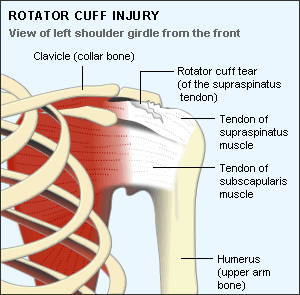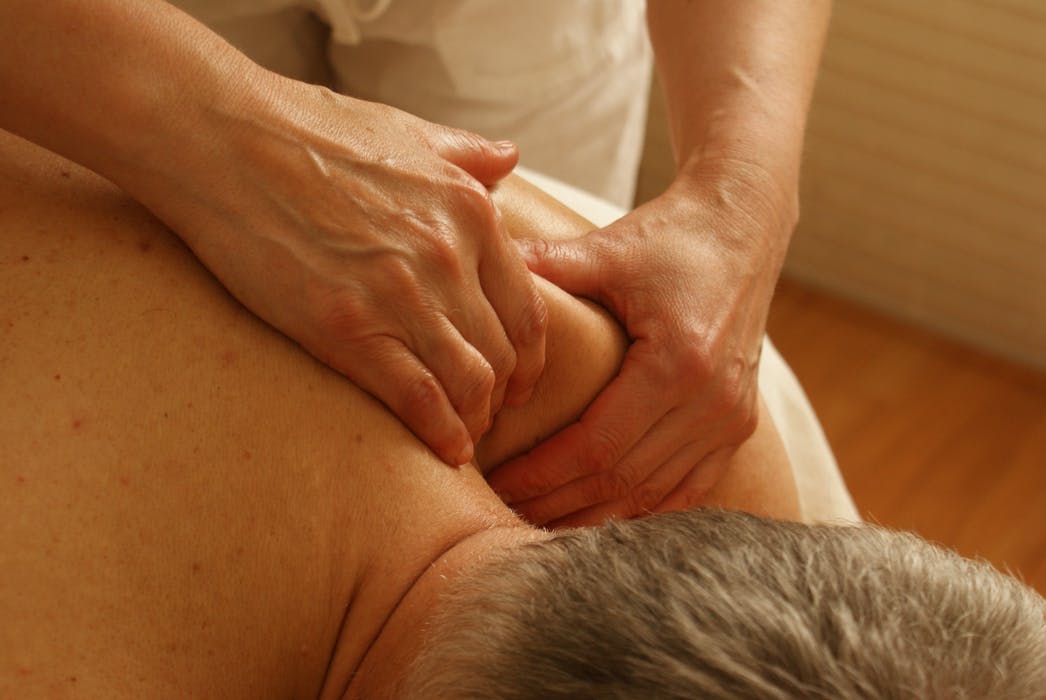|
BOOK NOW |
ASK ABOUT YOUR PAIN |
Home > Shoulder Physiotherapy > Blog > Rotator Cuff Injury
Rotator Cuff Injury

Our rotator cuff muscles refers to a group of muscles and tendons that surround our shoulder joint, and it functions to keep the head of your upper arm bone (humerous bone) firmly within the shallow socket of the shoulder.
A rotator cuff injury can cause a dull ache in the shoulder, which often worsens
- when you try to sleep on the involved side
- with aggravation ie lifting weight/load
- wrong angle of shoulder usage
Rotator cuff injuries occur most often in people who tends to have repeated overhead motions in their jobs or sports. Examples includes
- painters
- carpenters
- electricians
- housewives and househusbands
- people who play badminton, squash, baseball or tennis
The risk of rotator cuff injury also increases with age.
Many people recover from rotator cuff disease with shoulder physiotherapy that improve flexibility and strength of the muscles that surround and make the shoulder joint.
Unfortunately, sometimes rotator cuff muscle tears and pains may happen as a result of a single injury.
For these cases, medical and physiotherapy care should be provided as soon as possible. Extensive rotator cuff tears may also/even require
- surgical repair
- transfer of alternative tendons
- joint replacement.
Rotator Cuff Injury Symptoms
The pain associated with a rotator cuff injury may:
- Patients often describe the pain experienced as a dull ache deep in the shoulder
- That this condition disrupts/influence/disturb sleep, particularly if you lie on the affected shoulder
- Make it difficult to comb your hair or reach behind your back (for ladies, wearing bra/undergarments can be difficult), wearing long pants, socks and shoes can be difficult too
- Be accompanied by arm weakness
When to see a doctor
Shoulder pain that is short-lived may be evaluated by your family doctor. See your doctor right away if you have immediate weakness in your arm after an injury.
If you need/want us to refer you to experienced shoulder orthopedic specialists, get in touch with us and we'll connect you as well as part of our value-added services to you.
Rotator Cuff Injury Causes
Rotator cuff disease may be the result of either
- a substantial injury to
the shoulder
- progressive degeneration
- wear and tear of the tendon tissue
- repetitive overhead activity or heavy lifting over a
prolonged period of time may irritate or damage the tendon too
Rotator Cuff Injury Risk factors

The following factors may increase your risk of having a rotator cuff injury:
- Age
As you get older, your risk of a rotator cuff muscle injury increases. Rotator cuff tears are most common in people older than 40 years old. - Individuals who participate in certain sports
Athletes who regularly use repetitive arm motions, such as badminton and squash players, baseball pitchers, archers and tennis players, have a greater risk of having a rotator cuff injury (mainly due to the repeated overhand usage) - Construction/carpentry/plumbing/electrical/highly manual repetitive jobs
Occupations such as carpentry or house painting require repetitive arm motions, often overhead, that can damage the rotator cuff over time. - Family history
Unfortunately, there may be a genetic component involved with rotator cuff injuries as they appear to occur more commonly in certain families.
Rotator Cuff Injury Complications
Without proper treatment and/or physiotherapy, rotator cuff problems may lead to
- permanent loss of motion or weakness
- and may result in progressive degeneration of the shoulder joint
Although resting your shoulder is necessary for your recovery, keeping your shoulder immobilized for a prolonged time can cause the connective tissue enclosing the joint to become thickened and tight (frozen shoulder).
Rotator Cuff Injury Prevention
If you are at risk of rotator cuff injuries or if you've had a rotator cuff injury in the past, daily shoulder stretches and strengthening exercises can definitely help prevent future injury.
(If you prefer for a trained/experienced senior physiotherapist to help you work on your shoulder as opposed to you working on your shoulder yourself, then connect with us and we're more than happy to serve you.)
Most people exercise the front muscles of the chest, shoulder and upper arm, but it is equally important to strengthen the muscles in the back of the shoulder and around the shoulder blade to optimize shoulder muscle balance.
We can help you with that.
Rotator Cuff Injury Diagnosis

During the physical exam with the doctor, your doctor will press on different parts of your shoulder and move your arm into different positions. He or she will also test the strength of the muscles around your shoulder and in your arms.
In some cases, he or she may recommend imaging tests, such as:
- X-rays
Although a rotator cuff tear won't show up on an X-ray, this test can visualize bone spurs or other potential causes for your pain — such as arthritis. - Ultrasound (diagnostic/imaging type, different from our applied therapeutics ultrasound therapy which is great for rotator cuff injury physiotherapy too)
This type of test uses sound waves to produce images of structures within your body, particularly soft tissues such as muscles and tendons. It allows dynamic testing, assessing the structures of your shoulder as they move.
It also allows a quick comparison between the affected shoulder and the healthy shoulder. - Magnetic resonance imaging (MRI)
This technology uses radio waves and a strong magnet. MRI images that you will get will shoow all structures of the shoulder in great detail.
Rotator Cuff Injury Treatment

Conservative treatments — such as rest, cold therapy and physical therapy — sometimes are all that a patient needs to recover from a rotator cuff injury...unless your injury is very severe and involves a complete tear of the muscle or tendon, then you may need surgery.
(We can refer you to skilled shoulder specialists too, at no additional cost to you, as part of our value added services to you/loved ones).
Injections
If conservative treatments hadn't worked to reduce your pain (or if it's taking more time), your doctor might recommend a steroid injection into your shoulder joint, especially if the pain is interfering with your sleep, daily activities or exercise.
While such shots are often temporarily helpful, they should be used judiciously, as they can contribute to weakening of the tendon if used multiple times at the same tendon/joints.
Physiotherapy
Physical therapy is usually one of the first treatments your doctor may suggest.
Shoulder physiotherapy tailored to the specific location of your rotator cuff injury can help restore flexibility and strength to your shoulder. Physical therapy is also an important part of the recovery process after rotator cuff surgery.
Physiotherapy may include:
- gentle ranging exercises and stretches
- deep tissue releases for tight muscles
- ultrasound therapy to accelerate soft tissue healing
- strengthening to improve muscle strength balance
- etc
Surgery
- Arthroscopic rotator cuff repair
Many different types of surgeries are available for rotator cuff injuries, including:
- Arthroscopic tendon repair
In this procedure, surgeons insert a tiny camera (arthroscope) and tools through small incisions to reattach the torn tendon to the bone. (This is very commonly done, with less scarring and quicker/better healing too). - Open tendon repair
In some situations, an open tendon repair may be a better option. In these types of surgeries, your surgeon works through a larger incision to reattach the damaged tendon to the bone. Compared to arthroscopic procedures, open tendon repairs typically heal in the same length of time but recovery may be more uncomfortable. - Tendon transfer
If the torn tendon is too damaged to be reattached to the arm bone, surgeons may decide to use a nearby tendon as a replacement. - Shoulder replacement
Extensive/massive rotator cuff injuries may require a full or partial shoulder replacement surgery.
Rotator Cuff Injury Lifestyle and home remedies
Usually a minor rotator cuff injury often can heal on its own, with proper care and protection. If you think you've injured your rotator cuff, try these steps:
- Rest your shoulder
Stop doing what caused/aggravates the pain and avoid painful movements (especially movements that causes sharp pain). Limit all heavy lifting or overhead activity until your shoulder pain subsides. - Apply ice (cold therapy) and heat (heat therapy)
Putting ice on your shoulder helps reduce inflammation and pain. Use a cold pack for 15 to 20 minutes every three or four hours. After a few days, when the pain and inflammation have improved, hot packs or a heating pad may help relax tightened and sore muscles. - Take pain relievers/anti-inflammatories
Over-the-counter pain relievers such as ibuprofen (Advil, Motrin IB)) may be helpful.